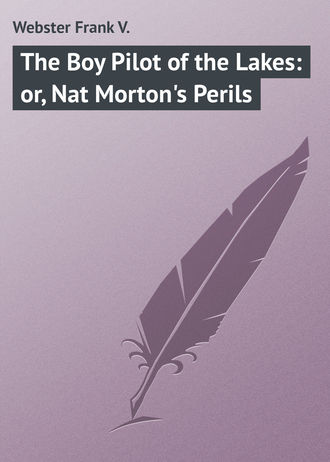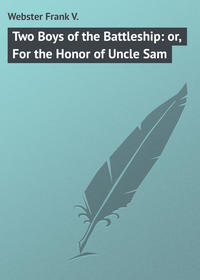 полная версия
полная версияThe Boy Pilot of the Lakes: or, Nat Morton's Perils
"This is another reason I wanted to change," remarked Mr. Weatherby, as he explained to Nat how the steam steering gear was operated. "That big wheel was getting too much for me to handle, especially in a storm. We'll have it easier now, and it will be more pleasant."
There was no doubt about this. The Mermaid was a new steamer, and was handsomely furnished. And it was much nicer to be among passengers, than delving away in a dark, dirty hold, checking up long cargo lists. Nat began to feel that his life had changed very much for the better. He had a new suit of clothes, and made a good appearance.
For about a week the Mermaid cruised on Lake Huron and Lake Michigan, taking on passengers, and some freight at one port, and leaving them at another. Nat was rapidly progressing in his chosen calling, and several times he had steered the vessel all alone, with no one in the pilot-house but himself, for Mr. Weatherby wanted the lad to acquire confidence.
Captain Turton was an agreeable man, and readily consented that Nat should have all the privileges possible, in order to learn more rapidly.
"I was young once myself," he said with a smile. "I had to pick up my knowledge of ships as best I could, and if I had had half a chance I would be a better navigator than I am now. In fact, I could have learned piloting among these many islands in Lake Huron, and that would have saved me hiring you, Weatherby."
"Well, if Nat keeps on, he'll soon be able to take my place," said the pilot with a smile. "He did nearly all the work to-day. I'm getting lazy, I guess. For the last few days I haven't felt like myself."
"Maybe you're getting malaria," suggested the captain.
"I'm getting something. Guess I'll take a big dose of quinine to-night."
"Better not to-night," spoke the captain.
"Why not?"
"Well, I don't like the looks of the weather. There seems to be a storm coming up, and you'll want all your wits about you if it comes on to blow much."
"Oh, I guess I can steer, even if my ears do ring with the quinine, and my head buzzes," answered Mr. Weatherby. "I must break up this languid feeling."
The Mermaid stopped at a good-sized city that evening, preparatory to making an all-night trip. As the boat touched the dock Nat saw on the end of the pier a telegraph messenger.
"Anybody named Nat Morton aboard?" the boy called, as soon as the ship was made fast.
"That's me," replied Nat.
"Well, I've got a telegram for you. I've been waiting three hours, and you've got to pay for my time."
"That'll be all right," said Mr. Weatherby, who was standing at the rail, beside Nat. "It's probably from Mr. Scanlon," he went on. "I was wondering why we didn't hear from him."
He paid the messenger boy, and Nat tore open the yellow envelope. The message was from Mr. Scanlon, and it was short. It said:
"Freighter arrived. Bumstead and nephew not aboard. They shipped on another vessel before arriving at Buffalo. Wire me what to do."
CHAPTER XVIII
NAT'S PLUCKY PILOTING
"Well, if that isn't tough luck!" exclaimed Nat.
"I suppose Bumstead thinks just the opposite," remarked the pilot.
"I wonder if he heard of our plan, and made the change of boats to escape us?"
"I think not. He could not know that we were after him. I fancy the mate and Captain Marshall had some disagreement. I know the mate did not like Mr. Marshall, who, in fact, was rather afraid of Bumstead. Very likely they had a quarrel, and the mate got aboard the first vessel he met."
"Then we can't have him arrested."
"Oh, I guess we can. It will take a little longer, that's all. He's sure to stick around the lakes, as he doesn't know enough of navigation to get a job anywhere else. News travels pretty well among those engaged in business up here, and we'll get on his track sooner or later."
"I hope so, for I want that money. When I didn't know I was to get any I was pretty well satisfied, but now that I have heard of this legacy, it seems as though I ought to get it."
"And so you shall. But I must telegraph to Mr. Scanlon. I don't believe we can ask him to do any more for us. He probably wants to continue on to New York. Besides, we can't inform him where to look for Bumstead. I'll just wire, thanking him, and tell him we'll look after the rascal now."
"I guess that's the only plan."
A message was sent to Mr. Scanlon, and by that time the Mermaid was ready to proceed. The indications of the storm became more pronounced, but it did not break that night.
Day after day slipped by and Nat kept steadily at work, learning all about piloting that was possible. It was wonderful how quickly he acquired the art of navigation.
"The boy was born to it," declared the old pilot to the captain. "He knows as much about it already as many assistants who have been at the wheel for ten times as long."
Mr. Weatherby was far from well, and Nat noticed that he could not keep at the wheel as steadily as before. One evening when a heavy storm was brewing the old pilot said every bone in his body ached.
"Guess I'm in for a spell of sickness, sure," he remarked.
"Can't you take some medicine?" asked Nat, sympathetically.
"Yes."
Mr. Weatherby took a large dose of quinine, so large that he was unable to remain in the pilot-house after midnight, but as the route was over a course he had previously traveled, Nat had no difficulty in steering the big vessel, with occasional help from Captain Turton.
"Well, Nat, how did you make out?" Mr. Weatherby asked him the next morning.
"Pretty well. I was a bit frightened at first, and I was afraid I would forget some of the signals, or read the lights wrong, and pile the boat up on an island or a bar, but I didn't."
"Glad to hear it. I was a little anxious about you. Now whatever you do, when you're in the pilot-house, don't lose your nerve. Just say to yourself that you're going to succeed, and bring the ship through, and you'll do it."
"There's more responsibility here than on a freighter."
"Indeed, there is! Think of all the human lives entrusted to your care. That will make you keep your nerve in case you get in a critical place. But you did very well, and I'm proud of you."
"How are you feeling this morning?"
"Pretty well. I can take my trick now. You'd better turn in and get some sleep. You may have to take part of the watch again to-night."
Nat did go to his bunk, after breakfast, but he did not stay there long. One of the cabin stewards was injured by a fall down a companionway, and Nat had to turn in and do this man's work. The result was the boy was kept busy nearly all day, occasionally taking a turn at the wheel.
Once, when he relieved Mr. Weatherby for a few minutes, while the pilot went below to take some medicine, he remarked to his benefactor:
"You don't look very well."
"And I don't feel very well, Nat. But I'm trying to stick it out. We've got a hard part of the lake ahead of us, a part where there are more islands than you can shake a stick at, and I don't like to go through there. But we've got to do it."
"But how can you, if you're sick?"
"Pilots, as well as other persons, can't always do as they would like to. I guess I'll be all right. But I don't like the weather. The longer this storm holds off, the worse it's likely to be. However, there's no use worrying. I'll be back in a few minutes. Keep her about as she is."
Left alone in the pilot-house Nat glanced at the compass, noted the course marked on the charts, and by moving the small steam steering-wheel slightly, found that the ship answered readily to the helm.
Off to the west there was a big bank of slate-colored clouds, from which, now and then, came low rumblings of thunder.
"I guess it won't be long before the storm reaches here," thought the young pilot.
Almost before the boy realized it, an hour had passed. He was so interested in steering the boat, and recalling the different points that had been impressed on him by the pilot, that he did not notice that Mr. Weatherby was gone much longer than he had said he would be away.
"It's taking him a good while to get his medicine," murmured Nat. "I hope he isn't going to be sick again to-night. I don't want to have to steer the vessel among a lot of islands."
He was now anxiously awaiting the return of Mr. Weatherby, for the storm seemed to be approaching more rapidly, and the darkness of the coming night was added to by the black clouds, that now covered the entire sky.
Nat shifted the wheel, to keep the vessel on the prescribed course, and was looking ahead through the fast-gathering gloom, when some one came into the pilot-house. He looked up to see Captain Turton, whose face wore a worried look.
"I'm afraid we're going to have trouble," he said.
"How so, captain?"
"Mr. Weatherby is very sick. I was just in his cabin, and I found him in a semi-conscious state. He had tried to take some medicine, but before he could get it he was seized with a sudden fit of sickness. I called in the doctor, and he said the pilot would not be able to take charge of the vessel to-night. I don't know what we're going to do, unless you can steer. Do you think you can?"
Nat hesitated. He had taken the freighter over this same course, when Mr. Weatherby was in the pilot-house with him, but that was in calm weather and daylight.
Could he steer the big passenger steamer over the same course after dark, and with a storm coming up? It was a question grave enough to make even an older person than Nat hesitate.
"It's a pretty big contract for a lad," said the captain. "I'll help you all I can, but the rules require me to have a pilot in charge. I can't do it, unless you feel that you can steer the ship, with such help as I can give you. Otherwise, I shall have to put into the nearest port, and I dislike to do that, as it will disarrange the passenger schedule, and the owners object to that."
"I – I think I can do it – at least I'll try," said Nat, determined to "keep his nerve" as the pilot had advised him. "I'll do my best."
"That's the way to talk, Nat! I guess you'll make out all right. Now I'll have to go to help look after Mr. Weatherby. He is in a bad way."
"Do you think he will – die?"
"Oh, no, it's not as serious as that, but he's quite sick."
As the captain turned away the rumbling of thunder grew louder, and there came fitful gleams of lightning from the black clouds.
Nat drew a long breath, and prepared himself for what he felt sure was coming. Then, almost as calmly as if it had been Mr. Weatherby himself, he gave his orders. The lookout was stationed in the bow, and the great searchlight, on a mast back of the pilot-house, and some distance above it, was set aglow. This was to disclose, during the storm, any vessels or other obstructions in the path of the Mermaid. This done, Nat prepared for his difficult task.
It grew darker, but with the blackness came the flashing of the beacon lights on dangerous reefs and islands. Nat was able to pick out his position fairly well, and he began to feel less nervous.
Suddenly, with a furious burst of wind, and a dash of rain, the storm enveloped the vessel. Great waves arose on the lake, and the ship began to pitch and toss. In fact, a storm on one of the great lakes is almost as bad as one at sea, if not worse, for it does not take long for the comparatively shallow water to become very much agitated.
Nat signaled for full speed ahead, as he knew he would need all the steerageway possible to take the vessel through the waves that, every moment, were becoming larger.
He had his supper in the pilot-house, for he would not leave to go to the cabin for it. Captain Turton came in during the evening to report that while Mr. Weatherby was resting easily, he was still quite ill.
"Do you think you can stick out through the night?" the commander asked.
"I'm going to," was Nat's plucky answer, though the boy was very tired from his long vigil the night previous, and his lack of sleep during the day. But Nat was not going to give in.
After the first outburst the storm settled into a steady blow, with torrents of rain, and an occasional brilliant flash of lightning, and loud peals of thunder. Through it rode the ship, urged on by her powerful engines.
The night wore on. Wearily, Nat clung to the small wheel in front of him, shifting the course of the vessel now and then, as he picked out the route on the chart, or made a quick shift to avoid some bar or island. His arms and legs were weary. His eyes were hot and smarting from lack of slumber and rest. But he stuck it out. Captain Turton offered to relieve him, but the boy did not want to give up. Even had he done so, the relief would have been short, as, while the commander was proposing it, word came that the ship had sprung a small leak, and the captain's presence was needed to see that the pumps were set going.
"We're depending on you, Nat," he said as he left the pilot-house.
"I'll stick it out," again came the plucky reply.
About three o'clock in the morning the wind shifted. The lake became choppy, from the cross seas, and a second section of the storm seemed to make its appearance. Nat, who in spite of his efforts to stay awake had caught himself nodding – in fact almost asleep once – started up suddenly. He peered out of the windows.
There, right in the path of the vessel, illuminated by the powerful searchlight, was a mass of foam. At the same moment the lookout yelled:
"Breakers ahead! We're headed for a reef!"
With a quick motion, while his heart almost stopped beating, Nat spun the little wheel around. The ship quivered. It seemed to hesitate, as if debating whether or not to rush to destruction on the sharp rocks, just hidden under the treacherous water, or to glide to one side.
Then, slowly, so slowly that Nat's heart almost ceased beating lest she should not change her course quickly enough, the Mermaid swung around, and her prow was pointed away from the dangerous reef.
Nat's plucky piloting had saved the vessel!
Into the little pilot-house rushed the captain. He had heard the lookout's cry, and had guessed what had happened.
"We were almost on Dagget's Point reef!" he exclaimed. "How did we escape it?"
"I saw it in time," answered Nat modestly.
"Thank God!" cried the captain, as he grasped the young pilot by the hand. "There's deep water all around us, and if we'd struck it would have meant a terrible loss of life."
At that instant there was a hoarse scream from a siren whistle, and, peering out of the windows of the pilot-house, Nat and the captain saw, looming up in front of them, but some distance away, another steamer. Nat blew a caution signal, and it was answered from the other vessel, which quickly turned aside, and then disappeared in the mist of rain.
"I believe they were headed right for the reef, too," said the captain. "You warned them in time. Well, we have a good course from now out. I'll take the wheel, and you go lie down."
But Nat would not. He insisted on remaining in the pilot-house until morning, and when daylight came, he saw that the other vessed was not far from them, both ships being headed for the same harbor. The other ship was the Spray, of much smaller tonnage than the Mermaid.
"She must have turned back after meeting us," thought Nat, "as she was headed in the opposite direction when we met near the reef."
CHAPTER XIX
THE ACCUSATION
Captain Turton decided to lay over for some hours, as, during the storm, his vessel had suffered some minor damage, which he wanted repaired.
"How is Mr. Weatherby?" asked Nat, as soon as there was no longer any need of him remaining in the pilot-house.
"He is much better this morning," replied the commander, "but he is still quite weak, and will probably stay in his bunk all day. He says he would like to see you."
"I'll go at once."
"Hadn't you better get your breakfast?"
"No, that can wait."
"But you have been on duty a long while, and it was a great strain on you."
"I know it was, captain, but I'm so glad I brought the ship through safely, that I'd be willing to go without breakfast and sleep for a long time yet."
"You are a plucky lad, and I wish more like you were learning to be pilots."
Nat found Mr. Weatherby quite ill, but, in spite of that, the pilot warmly congratulated his protégé on the nerve he had displayed during the storm.
"You have proved your worth, Nat," said Mr. Weatherby, "and I am proud of my pupil."
Nat turned in for a sleep, soon after breakfast. There was little for the crew of the Mermaid to do while the repairs were being made, and those passengers who were not yet at their destination strolled about the town while waiting for the trip to be resumed.
The vessel that Nat had brought so skilfully through the storm, which had ceased with the first appearance of dawn, was tied at the same dock as that at which was the steamer they had met near the reef. One was on one side, and one on the other, and when the dock between the ships was not occupied by wagons and trucks, laden with freight, Nat could look across and see the crew of the other steamer, the Spray, busily rearranging the cargo that had shifted during the storm. She was a freighter, but smaller than the Jessie Drew.
The appearance of one lad in the crew of the Spray attracted Nat's attention, when the young pilot arose early in the afternoon. The lad had red hair, and his figure seemed familiar.
"If I didn't think he was a good way off from here I'd say that fellow was Sam Shaw," mused Nat. "He looks a good deal like him."
He tried to watch, to determine if it was his former enemy, but, as the lad kept moving to and fro, it was impossible to be certain.
"If I saw Mr. Bumstead I'd know it was Sam who was with him," went on Nat, as he stood at the rail nearest the dock. "It might be possible they transferred to that ship. I wonder if I hadn't better speak to Mr. Weatherby, and ask his advice? No, he's sick, and I don't want to bother him about my affairs. I guess I'll just take a stroll over there and see for myself. Captain Turton won't care, as we can't sail until late this evening."
Nat started down the gangplank, but, when he was half way down, he met a man in uniform, who asked him:
"Is this the Mermaid?"
"Yes, sir."
"I am looking for a young man, named Nat Morton. Can you tell me where I shall find him?"
"That is my name," replied our hero. He thought perhaps it might be an officer from police headquarters, with some message concerning Mr. Bumstead.
"Then you are just the person I want," the man went on. "You will have to come with me."
"Come with you? What for? Is it about Mr. Bumstead?"
"Yes," replied the man. "How did you guess?"
"Well, I've been expecting a message regarding him."
"Then what you will hear will be no news to you."
"Has he been arrested?"
"Arrested? No. Why should he be arrested?"
"Why, I thought you said – "
"Perhaps I had better not say anything more until you get to headquarters," the man went on.
"Then it surely must be about that rascally mate," thought Nat. "Mr. Weatherby will be glad they have him."
He followed the man off the pier, and along a street on the water front.
"I understand you piloted that boat through the storm last night," said the man.
"Well, I did, but I guess it was more by good luck than anything else that enabled me to do it. Who told you about it?"
"Oh, it is pretty generally known. The crews of vessels talk more or less when they are in dock."
They walked along in silence a little longer, and then the man stopped in front of a small building.
"This doesn't look like police headquarters," thought Nat. "I wonder if there's a mistake."
"Go right that way," said the officer, keeping close behind the boy. "The harbor master is in that room."
"The harbor master?" repeated Nat. "What have I to do with the harbor master? I don't want to see him."
"No, but he wants to see you."
A moment later Nat was ushered into a room, where at a large desk sat a stern-looking man, and on either side of him were two men, each one with several books and papers before him.
"Ah, so this is the young pilot, eh?" remarked the man in the middle. "How old are you – er – Nat Morton? I believe that is your name."
"I will soon be sixteen."
"And you piloted the Mermaid past Dagget's Point reef last night – in that storm?"
"Yes, sir."
"I suppose you have a license."
"A license? No, sir. I am studying under Mr. Weatherby. He was taken suddenly ill last night, and I had to steer the boat. There was no one else."
"I am sorry, my lad," said the harbor master, "but I shall have to place you under arrest."
"Arrest? What for?"
"For piloting a passenger steamer without a license. A complaint has been lodged against you with this board – the board of control in charge of harbors and pilots."
"A complaint? Who made it?"
"Bumstead is the name – er – Joseph Bumstead, mate of the freighter Spray," replied the harbor master, reading from some documents before him. "He says he met your boat off the reef last night, that you were in charge, without a license, and that you nearly ran him down. He made the complaint about an hour ago. His boat had to put back here for some repairs. He says your boat damaged the one he is mate of."
"That's not so – I mean that part about nearly running him down!" exclaimed Nat. "I saw him in plenty of time, and if it hadn't been for my warning whistle the Spray would have gone upon the reef herself!"
"I am sorry, my lad, but the complaint is made in regular form, and I shall have to hold you for a hearing. However, we will have it at once. I have sent to summon this Bumstead. Do you wish to notify any friends?"
"Mr. Weatherby is ill, and cannot come, but I would like Captain Turton to come."
"Very well, we will send for him. Officer, bring Captain Turton here. In the meantime you may sit down until we reach your case," the harbor master motioned Nat to take a chair on one side of the big room.
CHAPTER XX
OFF AGAIN
"This is a queer turn to affairs," thought Nat, as he awaited the arrival of Captain Turton. "I never thought a thing about not having a license, when I steered the boat, and I don't believe Mr. Weatherby did either. I suppose I did wrong, but it was unintentional, and I don't see what else I could have done under the circumstances.
"But I'll have a chance at Bumstead now. As soon as I get out of here I'll cause his arrest. Hold on, though, maybe I'll not get out of here. I wonder what the punishment is for piloting a boat without a license?"
This was another phase of the queer affair. He realized if he was held on the charge, he would have no chance to make an accusation against the rascally mate.
"I know what I'll do," said Nat to himself, while he anxiously waited. "If Bumstead comes here I'll tell Captain Turton to go out and get a policeman. Then I can make a new complaint, charge Bumstead with keeping money belonging to me, and he'll be arrested. That's what I'll do."
While Nat sat in the office of the harbor master, he listened to several cases that were being disposed of. Captains of tugs and other boats were arraigned on charges of violating rules of the harbor; such as displaying wrong lights, crossing the course of other boats at the improper time, failing to give warning signals, colliding with other craft, or not filing the proper reports.
Some of the men were fined, others were suspended for a certain length of time, and one or two had their licenses revoked.
"I wonder what he'll do to me?" thought Nat. "There doesn't seem to be any case just like mine."
He was interrupted in his musing by the entrance of Captain Turton.
"What's this I hear?" asked the commander wonderingly, after he had greeted his young pilot. "Are you in trouble, Nat?"
"It seems so," and the boy told the circumstances.
"Don't worry," advised Captain Turton cheerfully. "I'll stand by you, and we'll have that mate arrested as soon as he leaves the place."






